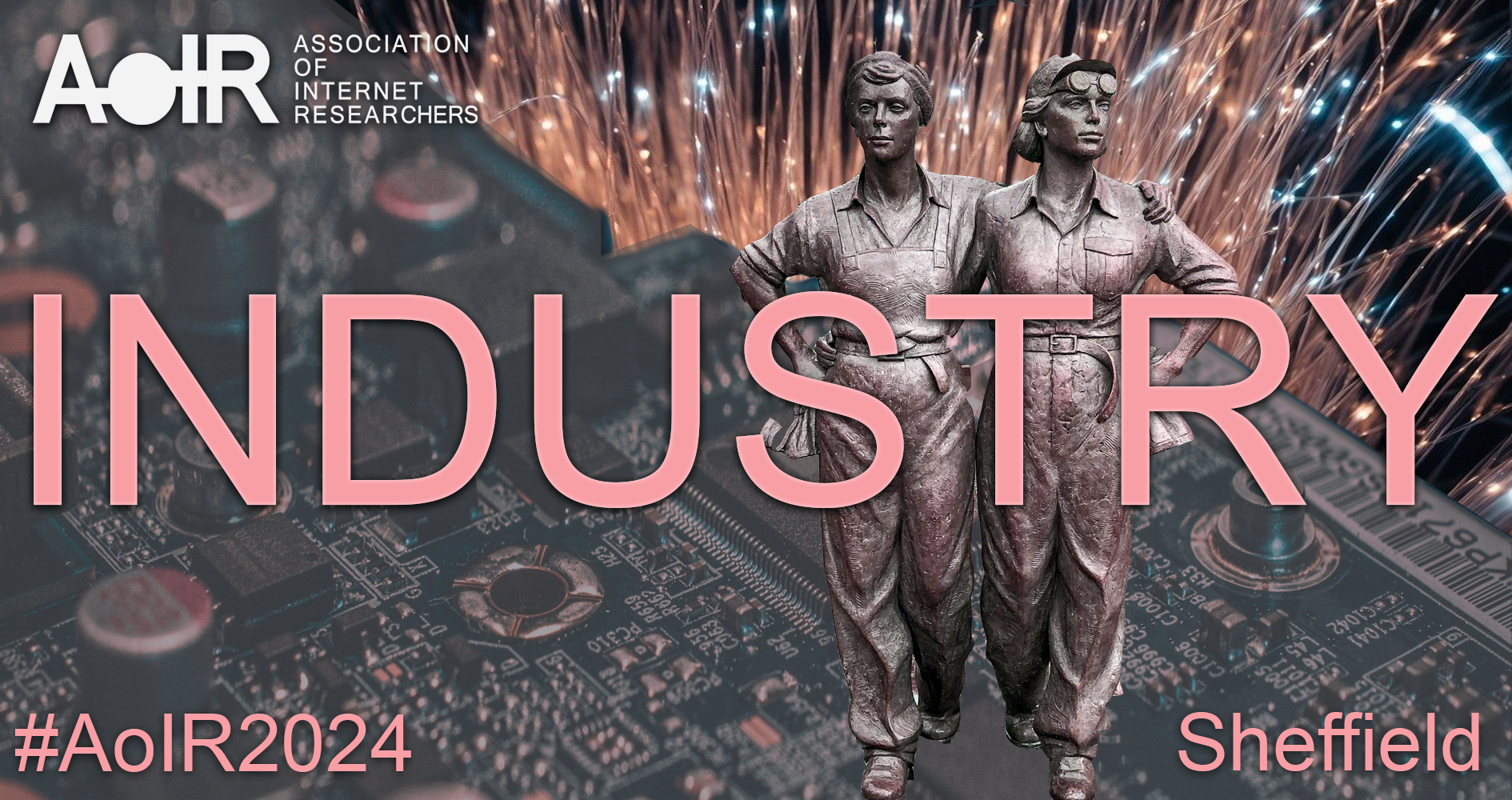AoIR2024 Conference Committee
The 2024 AoIR conference has been steered by a range of individuals, across staff families (both academic and professional services), and must therefore recognised as a team effort. Special thanks go to our two members of the University of Sheffield professional services team – Janine Wilson and Katie Brown – for their support in the event’s administration. We also wish to recognise the invaluable efforts of Hannah Ditchfield, Helen Kennedy, Gavin Lambert, Preeti Raghunath, and Gemma Tissington for their support at various crucial junctures.
The core local organising committee of #AoIR2024 consists of:
 Dr. Ysabel Gerrard (she/her), #AoIR2024 Local Conference Chair, is a Senior Lecturer in Digital Communication in the Department of Sociological Studies, University of Sheffield. Uniting her research is an interest in how young people – particularly those with vulnerabilities and/or stigmatised identities – use and experience social media. Ysabel has published this work in journals like New Media and Society and Internet Policy Review, and has a manuscript under contract with the University of California Press.
Dr. Ysabel Gerrard (she/her), #AoIR2024 Local Conference Chair, is a Senior Lecturer in Digital Communication in the Department of Sociological Studies, University of Sheffield. Uniting her research is an interest in how young people – particularly those with vulnerabilities and/or stigmatised identities – use and experience social media. Ysabel has published this work in journals like New Media and Society and Internet Policy Review, and has a manuscript under contract with the University of California Press.
Ysabel has attended AoIR conferences and participated in the reviewing process since 2017 and is delighted to be involved in AoIR2024!”

Lianrui Jia, #AoIR2024 Programme Chair, is a Lecturer at the University of Sheffield in the Department of Sociological Studies. Her research interests include political economies of communication, platform studies, and media policy and governance. Her work has been published in Media, Culture & Society, International Communication Gazette, Internet Policy Review, Internet Histories, among others. She is currently working on a book project on the topic of financialization of the internet in China. She serves on the editorial boards of Journal of Cultural Economy and Journal of Digital Media and Policy.
 Dr Ruth A Deller is a Reader in Media and Communication at Sheffield Hallam University, UK, where she is also the Ethics Chair for the Communication and Culture Research Institute. Her research interests are diverse, with a particular interest in research ethics, social justice and safer spaces, marginalised identity groups, fan and audience studies and social media communities. She is the author of Reality Television: The TV Phenomenon that Changed the World (Emerald, 2020) and has published in journals including Participations, the International Journal of Communication, the European Journal of Communication Studies, Transformative Works and Cultures and Celebrity Studies.
Dr Ruth A Deller is a Reader in Media and Communication at Sheffield Hallam University, UK, where she is also the Ethics Chair for the Communication and Culture Research Institute. Her research interests are diverse, with a particular interest in research ethics, social justice and safer spaces, marginalised identity groups, fan and audience studies and social media communities. She is the author of Reality Television: The TV Phenomenon that Changed the World (Emerald, 2020) and has published in journals including Participations, the International Journal of Communication, the European Journal of Communication Studies, Transformative Works and Cultures and Celebrity Studies.
 Tim Highfield is Lecturer in Digital Media and Society at the University of Sheffield, where he is also the Director of the Digital Society Network within the Faculty of Social Sciences. His research explores critical everyday interventions and implications of digital media. He is the author of Social Media and Everyday Politics (Polity, 2016) and co-author of Instagram: Visual Social Media Cultures (with Tama Leaver and Crystal Abidin; Polity, 2020).
Tim Highfield is Lecturer in Digital Media and Society at the University of Sheffield, where he is also the Director of the Digital Society Network within the Faculty of Social Sciences. His research explores critical everyday interventions and implications of digital media. He is the author of Social Media and Everyday Politics (Polity, 2016) and co-author of Instagram: Visual Social Media Cultures (with Tama Leaver and Crystal Abidin; Polity, 2020).
 Dr Jiahong Chen (he/him) is a Lecturer in Law at the University of Sheffield. His research interests include data protection law, cybersecurity law, law and AI, data ethics and internet regulation. He has published a monograph “Regulating Online Behavioural Advertising Through Data Protection Law” (Edward Elgar 2021) and numerous articles in leading journals such as International Data Privacy Laws. He is currently PI of the ESRC project “The Internet of Tactical Engagement” and Co-I of the RAI UK Keystone Project “Addressing Socio-technical Limitations of Large Language Models for Medical and Social Computing”.
Dr Jiahong Chen (he/him) is a Lecturer in Law at the University of Sheffield. His research interests include data protection law, cybersecurity law, law and AI, data ethics and internet regulation. He has published a monograph “Regulating Online Behavioural Advertising Through Data Protection Law” (Edward Elgar 2021) and numerous articles in leading journals such as International Data Privacy Laws. He is currently PI of the ESRC project “The Internet of Tactical Engagement” and Co-I of the RAI UK Keystone Project “Addressing Socio-technical Limitations of Large Language Models for Medical and Social Computing”.
 Dr Joan Ramon Rodriguez-Amat (he/him) is a Senior Lecturer in Journalism, Media and Communication at the University of Sheffield. His research interests build on the misfits between culture and digital data: sometimes researching on cultural policy and data; sometimes on culture and geodata location, and sometimes challenging online/offline community identities. Sometimes the three. He critically mixes computational methods and radical qualitative and interpretive approaches. His most recent publications include :
Dr Joan Ramon Rodriguez-Amat (he/him) is a Senior Lecturer in Journalism, Media and Communication at the University of Sheffield. His research interests build on the misfits between culture and digital data: sometimes researching on cultural policy and data; sometimes on culture and geodata location, and sometimes challenging online/offline community identities. Sometimes the three. He critically mixes computational methods and radical qualitative and interpretive approaches. His most recent publications include :
Rodriguez-Amat, J., 2024. Platforms, influencers, and distributed narratives. Obra digital, (25), pp.10-24. (https://revistesdigitals.uvic.cat/index.php/obradigital/article/view/431/518) ; Atteneder, H. and Rodriguez-Amat, J.R., 2024. Ideologies in Geospatial Futurism: a computational and critical discourse inquiry into the Arcgis and ESRI-blogs. Media and Communication, 12.; and Brantner, C., Rodriguez-Amat, J. and Stewart, J., 2024. Gauging the Google gaze: A digital visual analysis of images of a semi-peripheral town. Culture Unbound: Journal of Current Cultural Research, 16(1).

